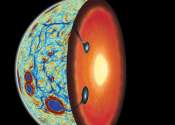Indian satellite confirmed US moon landing: scientist
India's first lunar mission has captured images of the landing site of the Apollo 15 craft, debunking theories that the US mission was a hoax, the country's state-run space agency said Wednesday.

India's first lunar mission has captured images of the landing site of the Apollo 15 craft, debunking theories that the US mission was a hoax, the country's state-run space agency said Wednesday.
Space Exploration
Sep 2, 2009
76
0

The Apollo missions to the Moon brought a total of 2,196 rock samples to Earth. But NASA has only just started opening one of the last ones, collected 50 years ago.
Planetary Sciences
Mar 11, 2022
0
2072

Notable events in the history of human space exploration:
Space Exploration
Aug 26, 2012
0
13

(PhysOrg.com) -- The Dutch national Rijksmuseum made an embarrassing announcement last week that one of its most loved possessions, a moon rock, is a fake -- just an old piece of petrified wood that's never been anywhere ...

A "potentially hazardous" asteroid measuring more than a mile long will zoom past Earth this week, the largest asteroid expected to get relatively close to our planet in 2022.
Astronomy
May 24, 2022
1
1028

About 4.5 billion years ago, a small planet smashed into the young Earth, flinging molten rock into space. Slowly, the debris coalesced, cooled and solidified, forming our moon. This scenario of how the Earth's moon came ...
Planetary Sciences
Apr 8, 2024
0
203

I've often been asked the question, "Can the astronauts on the Space Station see the stars?" Astronaut Jack Fischer provides an unequivocal answer of "yes!" with a recent post on Twitter of a timelapse he took from the ISS. ...
Astronomy
Aug 18, 2017
51
24

Tiny iron nanoparticles unlike any found naturally on Earth are nearly everywhere on the moon—and scientists are trying to understand why. A new study led by Northern Arizona University doctoral candidate Christian J. Tai ...
Space Exploration
Aug 20, 2021
14
2450

Future moon explorers will be bombarded with two to three times more radiation than astronauts aboard the International Space Station, a health hazard that will require thick-walled shelters for protection, scientists reported ...
Space Exploration
Sep 25, 2020
37
4323

SpaceX plans to carry out its first test flight on Monday of Starship, the most powerful rocket ever built, designed to send astronauts to the Moon and eventually beyond.
Space Exploration
Apr 15, 2023
1
3578
Apollo (Attic, Ionic, and Homeric Greek: Ἀπόλλων, Apollōn (gen.: Ἀπόλλωνος); Doric: Ἀπέλλων, Apellōn; Arcadocypriot: Ἀπείλων, Apeilōn; Aeolic: Ἄπλουν, Aploun; Latin: Apollō) is one of the most important and complex of the Olympian deities in Greek and Roman mythology. The ideal of the kouros (a beardless, athletic youth), Apollo has been variously recognized as a god of light and the sun, truth and prophecy, medicine, healing, plague, music, poetry, arts, archery, and more. Apollo is the son of Zeus and Leto, and has a twin sister, the chaste huntress Artemis. Apollo is known in Greek-influenced Etruscan mythology as Apulu. Apollo was worshiped in both ancient Greek and Roman religion, and in the modern Greco–Roman Neopaganism.
As the patron of Delphi (Pythian Apollo), Apollo was an oracular god—the prophetic deity of the Delphic Oracle. Medicine and healing were associated with Apollo, whether through the god himself or mediated through his son Asclepius, yet Apollo was also seen as a god who could bring ill-health and deadly plague. Amongst the god's custodial charges, Apollo became associated with dominion over colonists, and as the patron defender of herds and flocks. As the leader of the Muses (Apollon Musegetes) and director of their choir, Apollo functioned as the patron god of music and poetry. Hermes created the lyre for him, and the instrument became a common attribute of Apollo. Hymns sung to Apollo were called paeans.
In Hellenistic times, especially during the 3rd century BCE, as Apollo Helios he became identified among Greeks with Helios, Titan god of the sun, and his sister Artemis similarly equated with Selene, Titan goddess of the moon. In Latin texts, on the other hand, Joseph Fontenrose declared himself unable to find any conflation of Apollo with Sol among the Augustan poets of the 1st century, not even in the conjurations of Aeneas and Latinus in Aeneid XII (161–215). Apollo and Helios/Sol remained separate beings in literary and mythological texts until the 3rd century CE.
This text uses material from Wikipedia, licensed under CC BY-SA